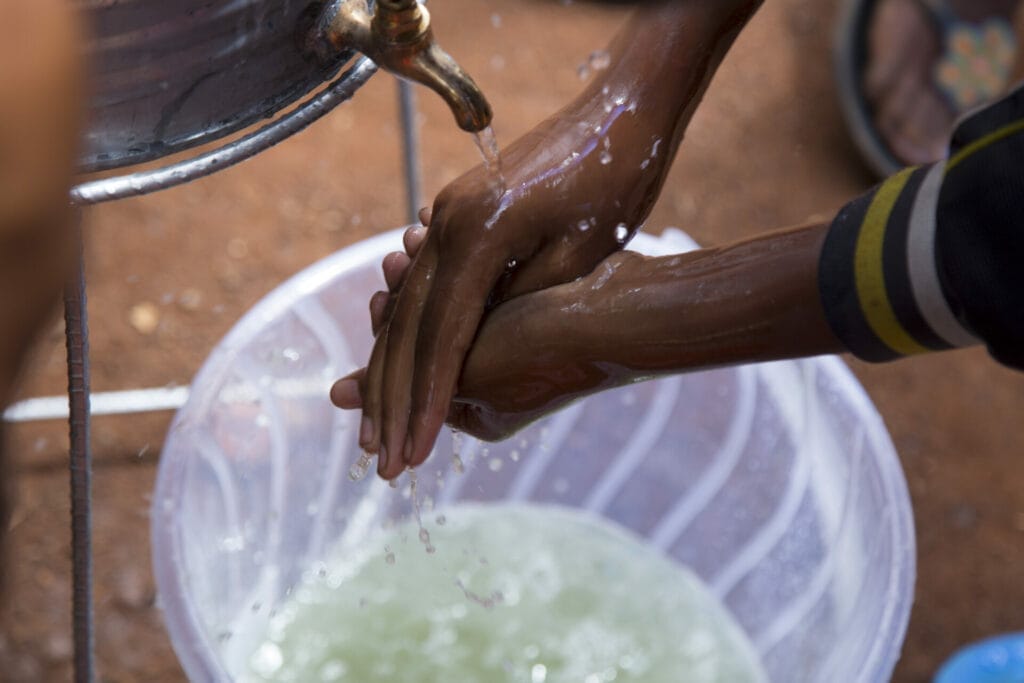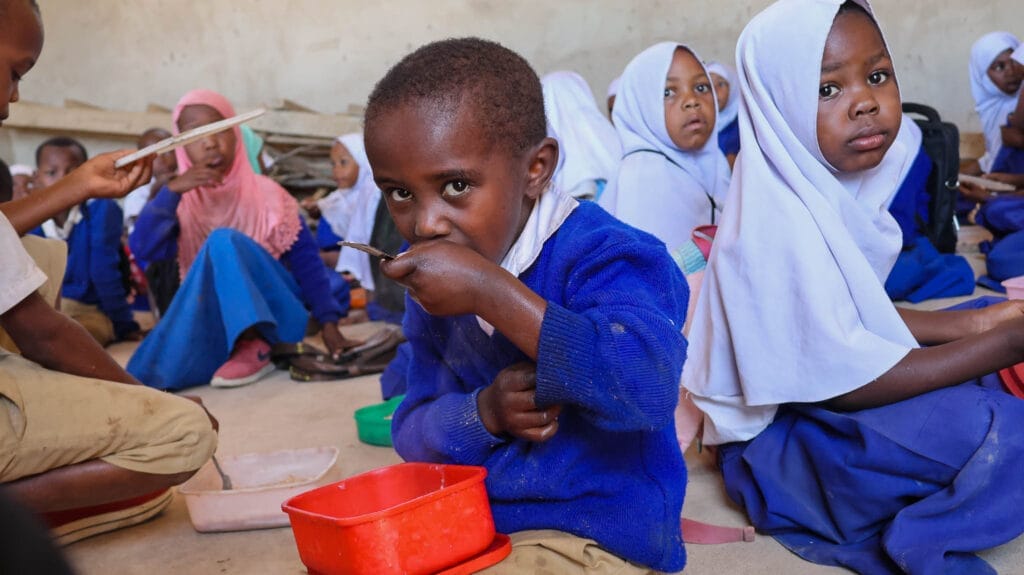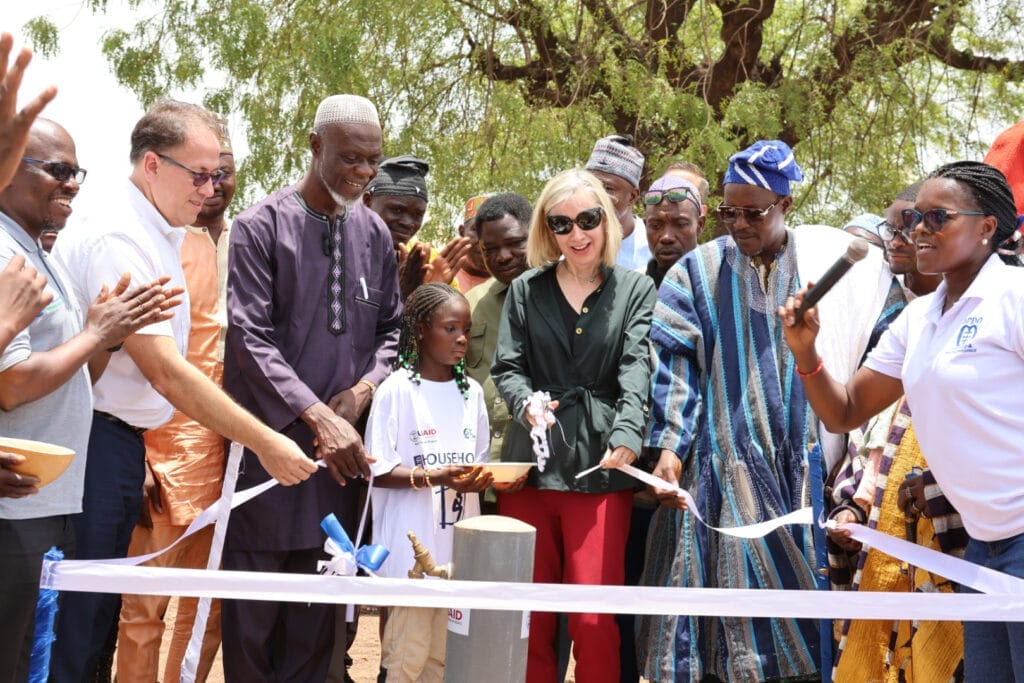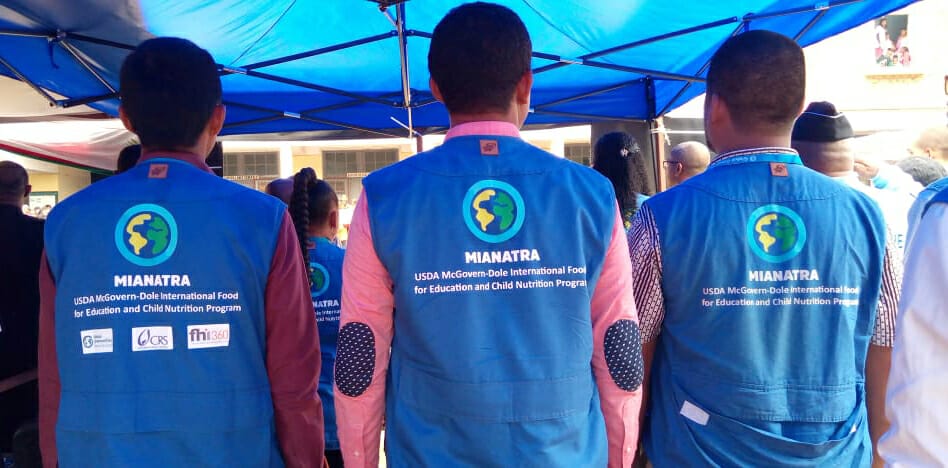Madagascar conjures images of vibrant ecosystems with plant and animal life that cannot be found in any other location across the globe. However, while rich in biodiversity, Madagascar is one of the poorest countries in the world with more than three-fourths of the population living below the poverty line.
Climate change has also heavily impacted Madagascar. Due to shifting weather patterns, the country has experienced prolonged drought for the past four years. Particularly in the southern region, food supply has diminished and plunged the country into food insecurity and devastating chronic malnutrition. In 2021, UNICEF predicted that malnutrition among children under five had quadrupled in the past year.
Global Communities is working to provide much-needed support to the hard-hit Malagasy community through its integrated school feeding approach. This multidisciplinary, student- and community-focused approach is flexible and tailored to the unique context of each school and community and improves preschool and primary school students’ learning outcomes by increasing enrollment and attendance rates, enhancing academic performance and improving their nutritional status. Global Communities is working closely with the Government of Madagascar, schools and communities to address immediate hunger through provision of daily nutritious school meals, improved health, water, sanitation and hygiene (WASH) and nutrition practices, and strengthened local capacity to take ownership of school feeding and complementary activities for sustained impact.
Improving Students’ Literacy, Health & Nutrition through School Meals
With funding from the U.S. Department of Agriculture (USDA), Global Communities is leading a consortium of partners including Catholic Relief Services (CRS), FHI360 and Malagasy Mahomby to implement the first McGovern-Dole International Food for Education and Child Nutrition (McGovern-Dole) project in Madagascar. This new five-year project, known as Mianatra (“Learn” in Malagasy), is implemented in close collaboration with the Government of Madagascar and local communities. Over the life of the project, Mianatra will provide 4,020 metric tons of U.S. donated commodities as well as funds to procure locally grown and purchased food to provide daily school meals to an estimated 64,177 preschool and primary school students in 130 schools in Southern Madagascar. Through the provision of daily, nutritious meals, Mianatra seeks to increase enrollment and attendance, particularly for girls, reduce short-term hunger and increase attentiveness.
Mianatra will improve the quality of literacy instruction by distributing school supplies and teaching materials, establishing libraries, producing books and supplementary reading materials, and training teachers, school administrators and school management committees. To improve student attendance, Mianatra will provide daily, nutritious meals and increase economic incentives for parents and families through savings and lending groups. Mianatra will also improve health, nutrition and dietary practices and will increase access to clean water and improved sanitation services through the construction of latrines, hand-washing stations and water points. Mianatra will partner with the Government of Madagascar, schools and communities to develop pathways and a model for school feeding and complementary activities and support the expansion of Madagascar’s National School Feeding program.
130
targeted schools to be reached through the life of Mianatra
64,177
students benefiting from daily school meals by the end of Mianatra
4,020
metric tons of U.S. donated commodities
Our Work in Madagascar
School Feeding
Delivering Healthy School Meals and Integrated Nutrition and Literacy Programs
Sanitation & Hygiene
Advancing the Goal of Clean Water for All
Expanding Economic Opportunity
Supporting Small and Medium-Sized Businesses and Community Savings and Lending Groups
Governance
Strengthening Civil Society, Democracy and Responsive Government
Positive Youth Development
Equipping Young People for Leadership and Success
Gender Equality & Social Inclusion
Lifting Marginalized Voices and Investing in Women as Leaders and Men as Allies
Health
Combating Disease, Improving Nutrition, and Ensuring Healthy Mothers, Children and Adolescents
Resilience
Enhancing Food Security, Sustainable Agriculture and Water Management in Climate-Affected Communities
Resources
Capacity Materials
CLEAR Cooperative Resilience Research
Global Communities through the USAID Cooperative Development Program -Cooperative Leadership Engagement Advocacy and Research (CLEAR) program, partnered with the United States International University – Africa (USIU-A) to conduct a 5-year longitudinal research study on the dynamics of social capital within the context of agricultural cooperatives in Kenya.
Research & Publications
Cooperative Resilience Longitudinal Study in Kenya
Global Communities through the USAID (United States Agency for International Development) Cooperative Development Program (CDP) known as Cooperative Leadership Engagement Advocacy and Research (CLEAR) project, partnered with the United States International University-Africa (USIU-A) to conduct a five-year longitudinal research study on the dynamics of social capital within the context of agricultural cooperatives in Kenya. Cooperatives…
Briefs & Case Studies
Cooperative Development (CLEAR+) Program Project Brief
Global Communities’ Cooperative Leadership Engagement Advocacy and Research (CLEAR)+ project (2023-2028), is a USAID funded Cooperative Development Program (CDP) aimed at advocating for the development of worker cooperatives with a focus on youth employment. CLEAR+ promotes the cooperative enabling environment and improved business strategies and performance through local Business Service Providers (BSPs) using a market…
Briefs & Case Studies
The USAID Cooperative Development Program CLEAR Learning Agenda Summary
Global Communities’ USAID-funded Cooperative Development Program (CDP) CLEAR Learning Agenda was designed to generate substantial evidence on effective strategies to foster a conducive environment for cooperative development in Kenya. The Learning Agenda’s primary objective was to offer insights to guide decision-making in program implementation and pave the way for the strengthening of cooperative businesses. A…
Briefs & Case Studies
The School Garden Model
Pamoja Tuwalishe’s School Garden Model operationalizes the NSFG and will be utilized in the 367 program-supported schools. This Model will be used to train and equip schools to nurture nutritious school gardens that will serve as learning sites for students to practice climate-smart agricultural practices while contributing healthy harvests for the students’ meals at school.…
NEWS
Latest stories from the blog

Igniting Children’s Potential, One Bite at a Time: Reflections from the International Food Aid Showcase
By Paula Rudnicka, Sr. Manager for Public Affairs Last month, Global Communities participated in the 2024 International Food Aid Showcase at the United States Department …
Read More
The Role of Mianatra in Enhancing School Attendance and Health in Madagascar
Until early 2023, EPP Toby Mahatsinjo, a primary school in the chronically food insecure Androy region of Madagascar, faced significant challenges related to water, sanitation and …
Read More
School Feeding Interventions as a Tool for Addressing Child Malnutrition: Experiences from Tanzania, Guatemala and Madagascar
By Betty Adera and Chloe Pan Malnutrition remains a pressing global issue, affecting millions of children and impeding their growth, development and well-being. It manifests …
Read More
Commissioning Ceremony Marks Milestone for Water Accessibility in Northern Ghana
On April 18, a historic event unfolded in Nawuhugu, located in the Northern Region of Ghana, as community members, local chiefs, esteemed dignitaries and stakeholders …
Read More
